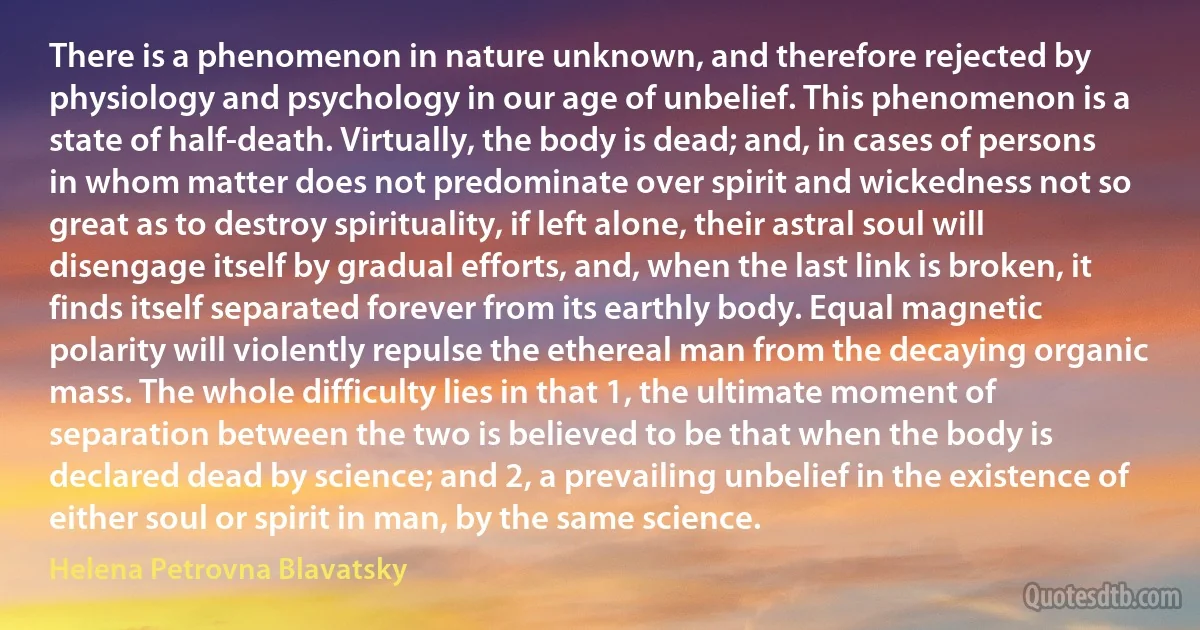
There is a phenomenon in nature unknown, and therefore rejected by physiology and psychology in our age of unbelief. This phenomenon is a state of half-death. Virtually, the body is dead; and, in cases of persons in whom matter does not predominate over spirit and wickedness not so great as to destroy spirituality, if left alone, their astral soul will disengage itself by gradual efforts, and, when the last link is broken, it finds itself separated forever from its earthly body. Equal magnetic polarity will violently repulse the ethereal man from the decaying organic mass. The whole difficulty lies in that 1, the ultimate moment of separation between the two is believed to be that when the body is declared dead by science; and 2, a prevailing unbelief in the existence of either soul or spirit in man, by the same science.
Helena Petrovna BlavatskyRelated topics
age astral body dead difficulty disengage equal forever gradual great last left link magnetic man mass matter moment nature organic physiology polarity psychology repulse science soul spirit spirituality state ultimate unbelief unknown liesRelated quotes
Justice is the end of government. It is the end of civil society. It ever has been, and ever will be, pursued, until it be obtained, or until liberty be lost in the pursuit. In a society, under the forms of which the stronger faction can readily unite and oppress the weaker, anarchy may as truly be said to reign, as in a state of nature where the weaker individual is not secured against the violence of the stronger: And as in the latter state even the stronger individuals are prompted by the uncertainty of their condition, to submit to a government which may protect the weak, as well as themselves: so in the former state, will the more powerful factions be gradually induced by a like motive, to wish for a government which will protect all parties, the weaker as well as the more powerful.

Alexander Hamilton
For what advantage is it, that the world enjoys profound peace, if thou art at war with thyself? This then is the peace we should keep. If we have it, nothing from without will be able to harm us. And to this end the public peace contributes no little: whence it is said, ‘That we may lead a quiet and peaceable life.' But if any one is disturbed when there is quiet, he is a miserable creature. Seest thou that He speaks of this peace which I call the third (inner, ed.) kind? Therefore when he has said, ‘that we may lead a quiet and peaceable life,' he does not stop there, but adds ‘in all godliness and honesty.' But we cannot live in godliness and honesty, unless that peace be established. For when curious reasonings disturb our faith, what peace is there? or when spirits of uncleanness, what peace is there?

John Chrysostom
Facts are but the Play-things of lawyers, - Tops and Hoops, forever a-spin... Alas the Historian may indulge no such idle Rotating. History is not Chronology, for that is left to lawyers, - nor is it Remembrance, for Remembrance belongs to the People. History can as little pretend to the Veracity of the one, as claim the Power of the other, - her Practitioners, to survive, must soon learn the arts of the quidnunc, spy, and Taproom Wit, - that there may ever continue more than one life-line back into a Past we risk, each day, losing our forebears in forever, - not a Chain of single Links, for one broken Link could lose us All, - rather, a great disorderly Tangle of Lines, long and short, weak and strong, vanishing into the Mnemonick Deep, with only their Destination in Common.

Thomas Pynchon
We've already said that it's the Holy Spirit who gives us the ultimate assurance of Christianity's truth. Therefore, the only role left for argument and evidence to play is a subsidiary role. I think Martin Luther correctly distinguished between what he called the magisterial and ministerial uses of reason. The magisterial use of reason occurs when reason stands over and above the gospel like a magistrate and judges it on the basis of argument and evidence. The ministerial use of reason occurs when reason submits to and serves the gospel... Should a conflict arise between the witness of the Holy Spirit to the fundamental truth of the Christian faith and beliefs based on argument and evidence, then it is the former which must take precedence over the latter, not vice versa.

William Lane Craig
I will give you another scripture, Jer. 46. 27, 28 - out of which the Lord shewed me what he would do for me and the rest of his servants. - But after he was pleased to reveal himself to me . . . Ever since that time I have been confident of what he hath revealed unto me. . . Therefore I desire you to look to it, for you see this scripture fulfilled this day and therefore I desire you that as you tender the Lord and the church and commonwealth to consider and look what you do. You have power over my body but the Lord Jesus hath power over my body and soul, and assure yourselves thus much, you do as much as in you lies to put the Lord Jesus Christ from you, and if you go on in this course you begin you will I bring a curse upon you and your posterity, and the mouth of the Lord hath spoken it. . .

Anne Hutchinson
